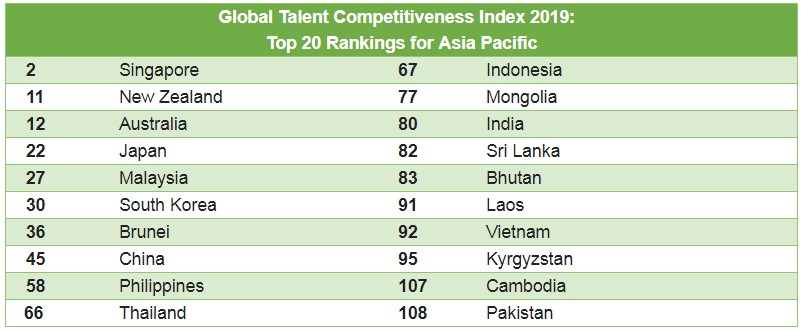Singapore tops Asia Pacific in talent competitiveness for the 6th straight year

Singapore retains its leading position in Asia Pacific for the sixth consecutive year in the Global Talent Competitiveness Index (GTCI) 2019, announced today during GTCI’s Asia Launch event at the INSEAD Asia campus in Singapore.
Produced in partnership with The Adecco Group and Tata Communications, the GTCI is an annual benchmarking report that measures the ability of 125 countries to compete for talent.
In the 2019 GTCI, six Asia-Pacific countries rank in the top 30: Singapore takes the lead in the region (2nd globally), followed by New Zealand (11th), Australia (12th), Japan (22nd), Malaysia (27th) and South Korea (30th).
Top-ranking countries share several characteristics, including having talent growth and management as a central priority, openness to entrepreneurial talent, open socio-economic policies as well as strong and vibrant ecosystems around innovation.

Singapore (2nd globally) continues to occupy the top spot in Asia Pacific. It is the highest-ranked country in three of the six pillars – Enable, Attract, and Global Knowledge Skills. It is also one of the strongest performers with respect to the pillar on Vocational and Technical Skills. However, the city-country’s lowest pillar rank in Retain (26th) signifying its relative weakness in retaining talent.
Bruno Lanvin, Executive Director of Global Indices at INSEAD and co-editor of the report, comments: “It comes as no surprise that Singapore is the leader in Global Knowledge Skills, the pillar that best reflects entrepreneurial talent. Compared to its competitors in the region, Singapore’s stellar performance shines through. In fact, it is no less than 10 places ahead of the second-best competitor in the region, New Zealand.”
China (45th) is in the top quartile in the Grow pillar, mainly as a result of having a world-class Formal Education. China also performs relatively well in the pillars related to enabling talent and Global Knowledge Skills.
Vinod Kumar, Chief Executive Officer, Tata Communications, comments: “Asia-Pacific is embracing technology-driven shifts at pace, with much-needed localization of services for the Asian consumer. In parallel to these shifts, it is critical that mindsets must also transform at an organization level for any digital transformation initiative to fully succeed.”
New Zealand and Australia, ranked second and third in Asia Pacific respectively, continue to demonstrate strong performance with their consistent rankings within the top 15 globally. New Zealand (11th) is a global leader with respect to the Enable (5th) and Attract (4th) pillars. Its ability to attract both foreign and domestic talent is strong. The pillar that is holding back New Zealand’s overall rank the most is Vocational and Technical Skills (20th). Australia (12th) is the best-performing country when it comes to Formal Education (1st).It also performs well with respect to the Retain pillar but ranks comparatively lower in the pillars related to enabling talent and Vocational and Technical skills.
Japan (22nd) is one of the leading countries in enabling talent. The area with the most scope for improvement relates to attracting (45th) talent, where improving gender equality indicators presents a particu¬lar challenge.
Malaysia (27th) is the only non–high-income country to make it into the top quartile in the ranking. The country is a solid all-around performer in the GTCI, with quite consistent performances in all six pillars. It appears in the top quartile in all pillars apart from Retain (34th). There is room for improvement in retaining talent and in indicators related to improving quality of life.
India (80th) remains the laggard of BRICS. Its best performance is to grow talent, which is the only pillar where the country is positioned above the median. Notwithstanding the scope for improvement across the board, India’s biggest challenge is to improve its ability to Attract and Retain talent, where it finds itself in the bottom quarter.
Globally, European countries continue to dominate the GTCI rankings, with 8 of them in the top 10. Unchanged from previous year, Switzerland ranks first globally, followed by Singapore and the United States.
















